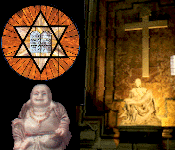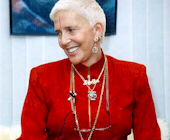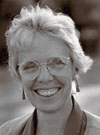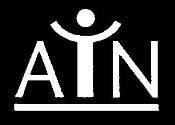By Jean Latz Griffin
Atlanta -- Bishop Carl Bean of Los Angeles, founder of the Unity
Fellowship Church and the Minority AIDS Network, was late, he said,
because "another black preacher just died in silence, and I was sitting
with the family who found out in the hospital that he was gay."
"The doctor tried to say it was all the drug use in the black community
that killed the preacher," Bean said. "But it wasn't. It was the silence
of the black churches who keep telling our young gay boys that if they
pray to God they can become straight. And if they take a church girl to
bed, they will be delivered. I am working up such righteous anger over
this that I am going to cut a path straight through black Christendom."
It could have been the 1980s. But it wasn't.
 As members of the AIDS National Interfaith Network gathered here last
week (November 7-11) to share ideas with theologians and other religious
leaders on how to involve more faith communities in helping people with
AIDS, their frustration over the prejudice, denial and homophobia of
many religious congregations was evident.
"I am saddened by the religious communities' response to this disease,"
said Rev. Jeff Peterson-Davis, executive director of the Atlanta
Interfaith AIDS Network and a Presbyterian minister. "You would think
this is where unconditional love would be. But it is clear there are
barriers -- certain people are not welcome. There are exceptions, and we
celebrate them, but they are too few."
As members of the AIDS National Interfaith Network gathered here last
week (November 7-11) to share ideas with theologians and other religious
leaders on how to involve more faith communities in helping people with
AIDS, their frustration over the prejudice, denial and homophobia of
many religious congregations was evident.
"I am saddened by the religious communities' response to this disease,"
said Rev. Jeff Peterson-Davis, executive director of the Atlanta
Interfaith AIDS Network and a Presbyterian minister. "You would think
this is where unconditional love would be. But it is clear there are
barriers -- certain people are not welcome. There are exceptions, and we
celebrate them, but they are too few."

The Rev. Troy Perry |
Peterson-Davis and others said they were angry at the silence of too
many congregations and that their work is overshadowed by the minority
of far-right religious groups who attract attention by opposing gay
rights or picketing funerals of those who have died from AIDS.
"People in my denomination all have AIDS -- if not in their body, then
in their minds and hearts," said the Rev. Troy Perry, founder of the
United Federation of Metropolitan Community Churches. "We live this
pandemic one day at a time." |
The leader of an Hindu-based interfaith community in Florida, Ma Jaya
Sati Bhagavati, spoke of burying "a young girl last week who did not
have a clue about the danger of sharing needles."
|
"Don't preach about this. Cry," said Ma Jaya, whose community, which
includes many gays and lesbians, runs an AIDS care program and respite
center called The River Fund. "How do the tears come? You imagine your
most beloved person -- your baby, your brother -- crying out for help in
a world that does not hear." |

Ma Jaya |
The AIDS National Interfaith Network was founded 10 years ago to
encourage faith communities to care for people with AIDS. Today, more
than 2,000 AIDS ministries are spread throughout the country -- at least
one in all but a handful of states -- but those at the conference said
it is still not enough.
Rev. James Allen, the former head of the Southern Baptist Convention
who became an AIDS activist when his two grandsons and daughter-in-law
were found to have contracted HIV from a blood transfusion in the late
1980s, commended the crowd for "having been in the trenches long before
I ever got my life earthquaked by HIV." Allen's son was not infected.
"Your blood is on the sidewalks; you have created a climate so that
others can come forward to help," said Allen, who has a second son who
is gay, HIV-positive and remaining healthy due to the latest drugs. "You
won't change reluctant religious groups through policies or resolutions.
Change comes through experience."
Allen, author of Burden of a Secret, said he still believes that the
Bible prohibits same-sex relationships. His gay son does not agree with
him. "But he has given me permission to be wrong. And I have given him
permission to be wrong," Allen said. "To accept each other without
approving of each other's beliefs is true love."
At a healing service and at lectures and roundtable discussions over
three days, representatives of various traditions spoke of their views
of homosexuality, AIDS and disease in general. They pointed out the
obstacles some religions present to helping people with AIDS and, in
contrast, the reason their faith has moved them to help others,
especially those on the margins.
Feminist theologian Emilie Townes of Kansas City criticized members of
her Christian faith for tolerating churches that "live, breath and
spew hatred and condemnation when it comes to those who have HIV and
AIDS."
Buddhist Sensei Pat Enkyo O'Hara, a lesbian who leads the Village Zendo
in Greenwich Village, explained that from the Buddhist perspective, "we
are all one body. Seen in this way, compassion for a person with
HIV/AIDS presents no special problem. Seeing ourselves as the one body,
we can say, "We all have AIDS."
In Judaism, the belief that "God loans us our bodies...and has the
right to restrict how we use them," means that everyone must take all
precautions to avoid becoming infected with HIV or infecting others, and
people with HIV must be cared for, given medical treatment and assured
of their "ongoing divine value despite any disability," said Rabbi
Elliot Dorff, professor of philosophy at the University of Judaism in
Los Angeles.

Rev. Carter Heyward |
Rev. Carter Heyward, author of Speaking of Christ: A Lesbian Feminist
Voice, said the reaction of many Christian churches to the AIDS crisis
underscored the Christian "equation of sin with sex...which has been how
the ruling class (of straight, white men) has maintained control of the
social order and guaranteed the perpetuation of patriarchal power
relations as a foundation of ecclesial, cultural, political and economic
order." |
Amir Al-Islam, secretary general of the World Conference on Religion
and Peace, which sponsors inter-religious dialogue, described his
struggle to find a way Islam can be more helpful to people with AIDS.
"African American Muslims have been virtually silent in the face of an
epidemic that threatens to annihilate a generation of black people,"
said Al-Islam, who is Muslim. He said because many Muslims view AIDS and
other illnesses as punishments for disobeying God, he is trying to
develop a model in which Muslims can be encouraged to care for people
with AIDS by focusing on "Allah's mercy and forgiveness."
Hinduism teaches that "if we show compassion and dignity and love to
others, that is when we get it back ourselves," said Partha Mukherjee of
Atlanta. "It is our version of 'what you sow, so shall you reap.'"
Hinduism neither condemns or condones any sexual activity as long as it
does not hurt anyone.
Catholic Bishop Priamo Tejeda of Puerto Rico, spoke of the "challenge
of offering compassion to situations that were considered contrary to
the principles of sexual morality...and [of] the inflexibility of the
concept of natural law." His solution was to "consider each human being
a creature of God, made in God's image and likeness, and therefore
worthy of respect and love and compassion."
The Atlanta conference, which was two years in the planning and drew
more than 200 people, was co-sponsored by the American Academy of
Religion, the Interdenominational Theological Center and the Interfaith
Health Program of the Carter Presidential Center, all headquartered in
Atlanta.
Jean Latz Griffin is a free-lance writer who has written extensively
about gay and lesbian issues for the Chicago Tribune, Common Boundary and the Sydney Star Observer.
|


 Atlanta: AIDS National Interfaith Network Meets
Atlanta: AIDS National Interfaith Network Meets
 As members of the AIDS National Interfaith Network gathered here last
week (November 7-11) to share ideas with theologians and other religious
leaders on how to involve more faith communities in helping people with
AIDS, their frustration over the prejudice, denial and homophobia of
many religious congregations was evident.
"I am saddened by the religious communities' response to this disease,"
said Rev. Jeff Peterson-Davis, executive director of the Atlanta
Interfaith AIDS Network and a Presbyterian minister. "You would think
this is where unconditional love would be. But it is clear there are
barriers -- certain people are not welcome. There are exceptions, and we
celebrate them, but they are too few."
As members of the AIDS National Interfaith Network gathered here last
week (November 7-11) to share ideas with theologians and other religious
leaders on how to involve more faith communities in helping people with
AIDS, their frustration over the prejudice, denial and homophobia of
many religious congregations was evident.
"I am saddened by the religious communities' response to this disease,"
said Rev. Jeff Peterson-Davis, executive director of the Atlanta
Interfaith AIDS Network and a Presbyterian minister. "You would think
this is where unconditional love would be. But it is clear there are
barriers -- certain people are not welcome. There are exceptions, and we
celebrate them, but they are too few."



